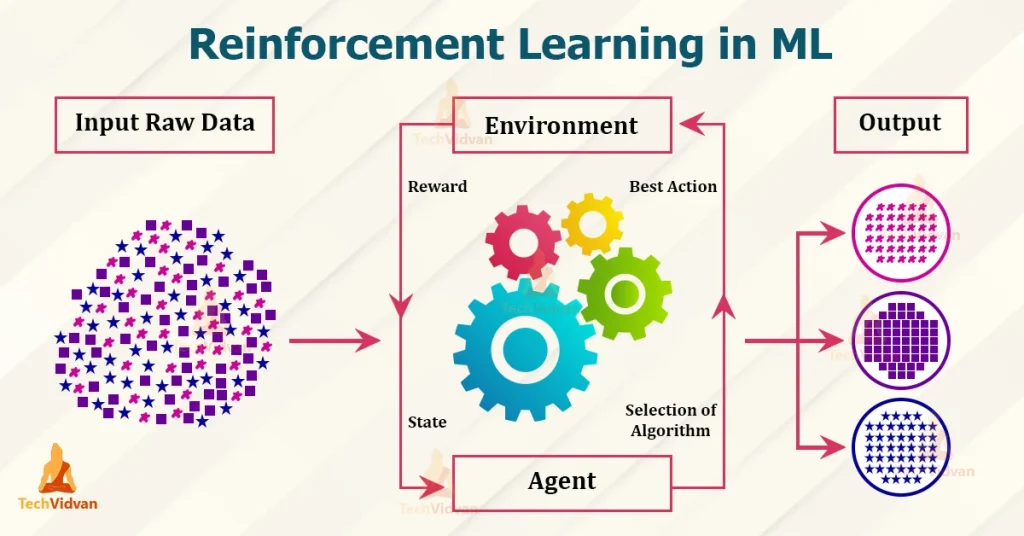Reinforcement learning (RL) is a pivotal concept in the realm of artificial intelligence (AI) that has revolutionized the way machines learn and make decisions.
With its ability to learn from interaction and experience, RL holds immense promise in various domains, from robotics and game-playing to recommendation systems and autonomous vehicles.
In this article, we delve into the intricacies of reinforcement learning, exploring its core principles, applications, and its role in shaping the future of AI.
Understanding Reinforcement Learning
Definition and Core Components
Reinforcement learning, often referred to as RL, is an AI paradigm that enables machines to learn through continuous interaction with an environment. Unlike other machine learning approaches, RL focuses on learning optimal actions by maximizing a reward signal received from the environment.
The Agent-Environment Interaction
RL involves an agent, which makes decisions and takes actions, and an environment, which provides feedback and rewards based on those actions. The agent interacts with the environment, learning from its actions and adjusting its behavior to maximize the cumulative reward.
Key Concepts in Reinforcement Learning
Reward Signals
The reward signal serves as the driving force behind RL. It represents the immediate feedback provided to the agent after each action. By associating rewards with specific actions, RL algorithms strive to learn policies that lead to maximum cumulative rewards.
Markov Decision Processes (MDPs)
MDPs are mathematical models used to formalize RL problems. They consist of states, actions, transition probabilities, and rewards. MDPs provide a framework for understanding the dynamics of RL environments and formulating optimal decision-making policies.
Value Functions and Policies
Value functions estimate the expected cumulative rewards an agent can obtain from a particular state or action. They guide the agent’s decision-making process by assigning values to states or actions based on their potential for rewards. Policies, on the other hand, determine the agent’s behavior by mapping states to actions.
Applications of ReinforcementLearning
Robotics and Control Systems
RL has found extensive applications in robotics and control systems, enabling machines to autonomously learn complex tasks and adapt to dynamic environments. From robotic arm manipulation to locomotion and grasping, RL empowers robots to learn and improve their performance through trial and error.
Game Playing and Strategy Development
RL has demonstrated remarkable success in game playing, surpassing human performance in complex games like Go and chess. By leveraging RL techniques, game-playing agents can learn optimal strategies and develop creative approaches to overcome challenges.
Recommendation Systems
Reinforcement learning is instrumental in enhancing recommendation systems. By leveraging user feedback and reinforcement signals, RL algorithms can personalize recommendations, improving user satisfaction and engagement. This enables platforms to deliver more relevant and accurate suggestions.
Reinforcement Learning and the Future of AI
Advancements in Deep Reinforcement Learning
Deep reinforcement learning combines RL algorithms with deep neural networks, enabling the learning of complex representations directly from raw data. This synergy has led to groundbreaking achievements, such as AlphaGo, autonomous driving, and natural language processing.
Ethical Considerations and Challenges
As reinforcement learning progresses, it becomes crucial to address ethical considerations and challenges. Balancing the pursuit of rewards with societal well-being, ensuring fairness, and mitigating biases are critical aspects that need to be taken into account while deploying RL systems.
Conclusion
Reinforcement learning, with its ability to learn through interaction and maximize rewards, has become a cornerstone of AI. Its applications span diverse domains, from robotics and games to recommendation systems, promising advancements and innovation.
As we continue to unravel the full potential of reinforcement learning, we must tread responsibly, addressing ethical concerns and leveraging its power to create a brighter and more intelligent future.

